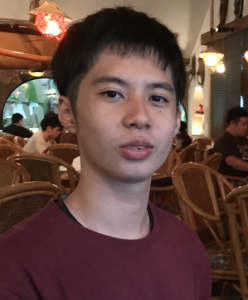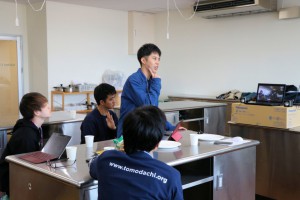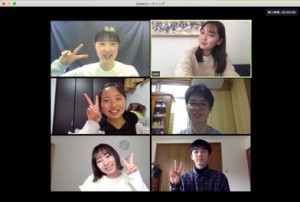プログラム参加者・TOMODACHIアラムナイに聞いてみました!:上原拓也氏

沖縄県出身の上原拓也氏はTOMODACHI-Frogs Jr. プロジェクト のアラムナイです。立命館アジア太平洋大学の国際経営学部でマーケティングを専攻し、企業と顧客間のサービスの交換を通して価値を共に創造することを説明する、行動経済学の理論的フレームワークであるサービスドミナントロジックに基づいて卒業論文を執筆しました。アラムナイとしてTOMODACHI地域フレームワークの九州地域のイベントに積極的に参加し、母校である興南高校では、同じ大学の受験を志す高校生のサポートをしました。
このインタビューは、2021年12月2日にTOMODAHIアラムナイ・インターン(2021)の鈴木真宝(東京)によってオンラインで行われました。
Q1:どのようにTOMODACHI-Frogs jr.プロジェクトへの参加を決めましたか?また、プログラムではどのようなことを学びましたか。
私は中学2年生の時に先生に紹介され、那覇市児童生徒交流事業に参加しました。この事業に一緒に参加した生徒が、翌年TOMODACHI-Frogs jr.プロジェクトに参加することで前向きに発言をし、活動的になったのを見て、同じプログラムへの参加を決めました。
プログラムでは半年かけて、ゼロからビジネスを創り出す方法を学びました。具体的には、顧客が抱える問題を見つけ出し、デザイン思考を通じて顧客の頭の中に潜り込むことを学びました。プログラムに参加することで、学校では学べないビジネスに関することを学べたのはもちろんのこと、日本国内およびシリコンバレーで新たな事業を日々生み出している方から話を聞くことで、周囲と異なることに動じない、失敗を恐れずに挑戦するマインドを身につけることができました。

TOMODACHI RISE リーダーシップ・プログラムのようす
Q2:TOMODACHIプログラムでの経験で、上原さんの進路や今の活動に影響を与えていることはありますか?
私がプログラムで学んだ事は、失敗を恐れず挑戦すること、周囲と異なることに動じないことです。プログラム参加後、様々なアクションを自ら起こすことが出来ました。高校で日々過ごす中で、同じクラスの友人がどんな大人になりたいか、どのような進路を選択すべきか分からない、と悩んでいました。何かのヒントになれば良いと、沖縄で自己実現をした大人にインタビューし、内容を冊子にまとめ、同級生に届けようと思い、インタビュー誌kangarooを発行しました。発行した冊子は、自分が通っていた高校だけでなく、県内の予備校や学習塾にも配布されました。
Q3:参加したTOMODACHIのプログラムの中で特に印象に残っていることは何ですか?また、今でも同じプログラムに参加したアラムナイとつながっていますか?
特に印象に残っているのは、新たな事業を生み出す人の中には、その事業にその人の人生がかかっていることで、その人の生活がまるでスポーツ選手のようにストイックである一方で、周囲に自分の生き方を知ってもらうため、自分の生き方を楽しく話す人もいることです。加えて、未来を創るには自分にも他者にも投資が必要だという言葉も深く心に残っています。
また、今でも自分と同じく教育に興味のあるアラムナイや、自分と同じ趣味を持っているアラムナイと連絡を取り合っています。ソーシャルメディアを通じて、近況をお互いに伝えあったりするだけでなく、自分が新しい知識を得た記事や本などがあったらお互いにシェアし合っています。
Q4:TOMODACHIとは、あなたにとってどのような存在ですか?
TOMODACHIとは、私にとって、今の自分が知らない世界を知る機会です。プログラムに参加して、ビジネスという新しい学びを得ることが出来ました。TOMODACHI RISEリーダーシップ・プログラムを通じて、沖縄地域のイベントに、参加者として、また九州地域のアラムナイプログラムに企画者側としても関わったことで、同じ興味を持つ人々とも出会うことが出来ました。
Q5:将来の目標や夢は何ですか?
将来は、個人が自分以外の他者と分かち合いたいことを、他者が腑に落ちるような言葉や形で分かち合えるよう導き、社会に投げかけるサポートを自分自身がしてみたいです。また、ゆくゆくは自分自身の体験も他者に共有したいです。
私は、入学時、大学でレポートを書くことに苦戦し、大学の先輩にお世話になることで、不得意だったことを得意にした経験があります。それをきっかけに、自分も後輩たちにレポートを書くことを得意になってもらいたいと思い、初年次教育および入学前イベントの学部生TA(ティーチング•アシスタント)になることを決意しました。2年間TAとして、教員の代わりに1コマの講義の半分を担当し講義を運営したほか、担当した学生のサポートに従事しました。
私がTAに従事する中で最も苦戦したのは、コロナウイルスの流行により、大学の講義の形態が教室からオンラインでの開講に移行したことです。この際も、担当する学生同士が講義内で交流できるために様々な工夫をしました。具体的には、講義の開始から3分間は決められたテーマもしくは学生が決めたテーマに基づいておしゃべりをする「ぺちゃくちゃタイム」を実施しました。これにより、当初の問題が解決したほか、学生同士の交流が自ずと図られるようになりました。
また、私はギャップイヤーのように、自分の将来について考える時間を作る事は良いことであると考えています。しかし「ギャップ」という言葉がマイナスなイメージを持たれることがあると感じているため「キャリアイヤー」などと名前を付けて、将来の選択肢を増やす時間を多くの人がとれるようになるといいなと考えています。

入学前イベントで担当した学生さんとの記念写真(本人は右側2段目)


